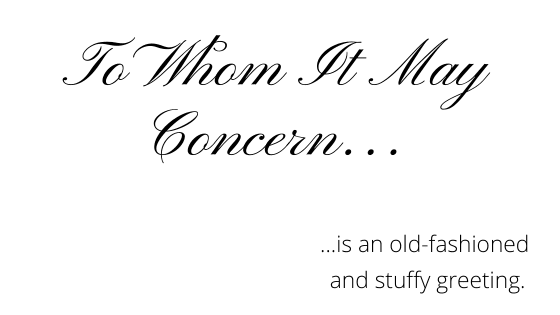Here’s How to Address Your Cover Letter to HR (It’s Not “To Whom It May Concern”)

If you’re wondering how to properly address a cover letter to HR, you’ll want to read this! We’ll teach you why you should avoid using “to whom it may concern” in your cover letter, who you should address it to, and how to write a cover letter greeting with no name.
Updated June 2024.
By: Katelyn Skye Bennett | Contributor for Let’s Eat, Grandma
Applying for jobs can prove time-consuming and stressful. At times, it may seem easier to send out mass applications.
However, if you truly want to be considered, you need to tailor your resume and cover letter, which includes acknowledging the people on the other end of the application process.
There are a few factors you need to examine when deciding how to address a cover letter to HR.
This article will walk you through how to decide who to address your cover letter to, how to write a formal salutation to them, what to do if you can’t find the right person, and what a proper cover letter heading should look like.
Let’s Eat, Grandma is here to support you every step of the way in your job search journey. Request a free resume critique today for honest feedback from a senior resume writer on your resume, and take the first step toward securing your dream job.
Who do I address my cover letter to?
Some job postings are kind enough to list the person to whom your application will be sent. In this case, you’re all set! You have the staff member’s name and can address the person formally now.
However, if the name isn’t listed up front, it’s time to dig a little deeper.
Ready for more job search help?
Sign up for a free Senior Writer Resume Critique to see what's holding you back from landing interviews. One of our top professional resume writers will give you personalized feedback on the top 3 items you can improve based on our expert practices!
First, head to the company website to look for the name of the hiring manager.
Most companies have some sort of “About Us” or “Who We Are” page, and this page tends to list the higher-ups if not the full staff.
More comprehensive sites may allow you to search by program or department. Some “Contact Us” pages also contain further information on staff and should at least offer a phone number to help you find out.
If you’re not finding the hiring manager’s information within the site, take a step back to your search engine and type in the name of the company next to “hiring manager.” It’s worth a try since this may pull up the correct link for you, bypassing the process of exhaustively searching through the website itself.
If that didn’t turn up any results, head over to the job seeker’s best friend: LinkedIn. Search LinkedIn for the name of the company and “hiring manager.” You might find recruiters and “talent acquisition partners” as well. One of these people may be the one who will read your application, and even if not, you can still reach out to them to find out who will.
Research, research, research. If you still aren’t completely certain of who the hiring manager is, use the name of the closest applicable person as you address the cover letter.
This could be someone in a senior HR position or even the head of the department you’re applying to. In any case, this is better than not using a name at all!
If you can’t find any of the necessary information online, you can always take a more active approach and call the company to request the name of the hiring manager.
How to properly address a cover letter to HR
Now that you have the name – how do you proceed?
“Dear” is still the most popular salutation, and adding formality shows respect. When possible, it’s best to use the full formal name, eg., “Dear Ms. Anna Peregrine,” or “Hello, Mr. Armend Fazlic.”
“Ms.” is always the safest option for female hiring managers unless you know for a fact that they are married.
When you begin to write, make sure you have the correct spelling and gender of the name of the hiring manager (or whoever you’re writing to.) Names are easy since you can copy and paste them, but if the staff member’s gender is unknown to you, make the effort to find it out. No one likes being misgendered!
And the experts are in agreement: if you do not know the person’s gender, leave off the honorific (Ms./Mr.) and simply use their full name.
Avoid “To Whom It May Concern” on your cover letter
Feeling good about your cover letter? Good! You should be! You’re on track to being hired.
But wait, you still can’t find the person’s name that you need? Don’t sweat.
In the case that the company’s website is incomplete, and you can’t get the information over the phone, don’t use To Whom It May Concern!
At Let’s Eat, Grandma, we advise against this generic cover letter greeting. We aren’t fans of “Dear Sir or Madam” for similar reasons, plus it sounds too old fashioned for 2023. Indeed agrees with us.
Instead, use a formal greeting to the position of the person you believe will read the cover letter. Address the letter to the best title for the unidentified staff member.
For example, “Dear Hiring Manager,” “Dear Human Resources Director,” or “Dear Talent Acquisition Lead.”
Even if you are sending out application after application, take the time to research the HR department for specifics if you are serious about getting a job at that company. But if you truly couldn’t find anyone, you’ll be okay with a cover letter salutation with no name.
Just don’t be vague. Even “Dear Hiring Manager” is better than “To whom it may concern,” on a cover letter, though the more specific the position is, the better.

Photo by TheStandingDesk on Unsplash
What’s the proper cover letter heading?
Congratulations! You’ve successfully addressed your cover letter. The opening salutation of your cover letter may seem like a small detail, but acknowledging the correct person goes a long way.
Next up, you’ll want to perfect your cover letter heading! You’ve probably seen examples of cover letters with lengthy details of your contact information and the company’s at the top.
Cover letters are meant to explain why you’re a good fit for the position, and if the hiring manager is only going to skim the letter, why bulk up the page with irrelevant information? HR isn’t going to visit your house in person or use snail mail to communicate about the job, so cut that content.
Adding your email address and phone number either beneath your signature at the bottom or including them along with your City, ST in a document header is more than sufficient.
In fact, we suggest using the same 2-line header from the top of your resume! This will help the hiring manager identify your cover letter when it’s printed, as well as making you look more professional with matching documents.
Acknowledge the hiring manager and the position you’re applying for, and then jump into why the company should hire you!

Photo by Christin Hume on Unsplash
In conclusion, crafting an effective cover letter is a critical step in the job application process. By addressing the cover letter appropriately, you can demonstrate your attention to detail, professionalism, and genuine interest in the position.
Whether you are able to find the hiring manager’s name or need to use a more generic salutation, it is essential to approach the task with care and thoughtfulness. Remember to personalize the content of your cover letter to align with the needs of the company and showcase how your skills and experiences make you an ideal candidate.
Taking the time to address your cover letter properly shows your dedication to making a positive impression and sets you apart from the competition. By following these guidelines and incorporating your own unique voice and qualifications, you can create a compelling cover letter that captures the attention of potential employers and increases your chances of landing your dream job.
Ready for more job search help?
Sign up for a free Senior Writer Resume Critique to see what's holding you back from landing interviews. One of our top professional resume writers will give you personalized feedback on the top 3 items you can improve based on our expert practices!


